For avid hunters, backcountry hunting trips are a thrilling and rewarding experience. However, before venturing out into the wilderness, it’s crucial to ensure that you have all the essential gear for a safe and successful hunting trip.
A backpacking hunting checklist is an excellent tool to help you keep track of everything you need to bring along.
Contents
From lightweight backpacks to reliable hunting optics, having the right gear can make all the difference in your hunting experience.
In this article, we’ll explore why a backpacking hunting checklist is important and provide you with a comprehensive guide to essential gear for your next backcountry hunting adventure.
Key Takeaways
- A backpacking hunting checklist is essential for keeping track of all the gear you need for a safe and successful hunting trip.
- The right gear can make a significant difference in your hunting experience, from lightweight backpacks to reliable optics.
- This article will provide a comprehensive guide to essential gear for backcountry hunting adventures.
- Choosing the appropriate backpack and hunting gear is crucial for a comfortable and successful hunting trip.
- Packing efficiently and navigating safely in the backcountry are also important considerations for backcountry hunting.
Why You Need a Backpacking Hunting Checklist
Backcountry hunting trips are exhilarating but can be challenging. They require a lot of planning, especially when it comes to packing the right gear.
Forgetting essential items could mean the difference between success and failure, and even more critically, safety. This is where a backpacking hunting checklist comes in.
It ensures that you don’t forget any key items, whether you’re going on a packing elk hunting or deer hunting checklist trip.
Having a checklist also saves you time and money. For example, imagine you forgot to pack your hunting knife. You would have to cut your trip short or spend extra time and money purchasing a new one.
Additionally, a backpacking hunting checklist ensures that you’re prepared for all the potential dangers of the backcountry.
It’s easy to get lost or injured when hunting in remote areas, so having the right gear is crucial. Overall, having a checklist is essential for any serious backcountry hunter.
It saves you time, money, and ensures that you’re prepared for any challenges that may come your way. So, what should be on your backpacking hunting checklist? Let’s take a look.
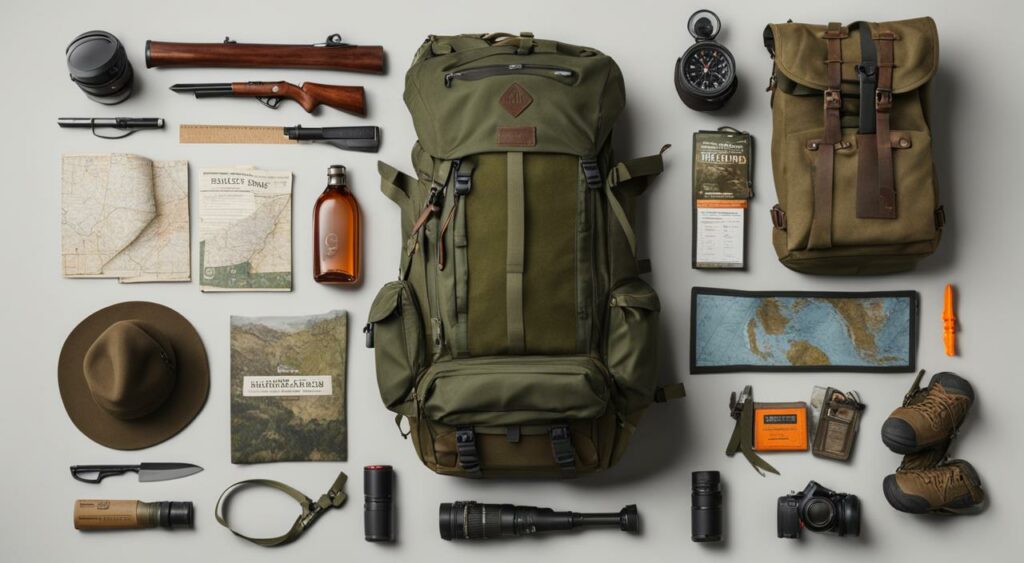
Essential Gear Checklist for Backpacking Hunting
When it comes to backpacking hunting trips, having the right gear can make all the difference. A checklist is a crucial tool for ensuring that you don’t forget any essential items.
The following checklist includes not only hunting-specific gear but also important items for backpacking in general, such as a lightweight backpack and sleeping bag.
| Item | Description |
|---|---|
| Hunting knife | A sharp, durable, and reliable hunting knife is a crucial tool for field dressing and processing game. |
| Backpack | A quality hunting backpack with a sturdy frame and multiple compartments is necessary for carrying all your gear. |
| Sleeping bag | A lightweight and compressible sleeping bag is essential for staying warm and comfortable during cold nights. |
| Tent | A lightweight, durable, and waterproof tent provides shelter and protection from the elements. |
| Water filter | A water filter or purifier ensures access to clean drinking water, which is essential for staying hydrated during long hikes and hunts. |
| Stove and fuel | A portable stove and fuel are necessary for cooking meals and boiling water. |
| First aid kit | A comprehensive first aid kit is critical for treating minor injuries and preventing them from becoming more severe. |
| Map and compass | A map and compass, as well as the knowledge to use them, are essential for navigating in the backcountry. |
| Headlamp | A reliable and bright headlamp allows you to navigate the backcountry, set up camp, and process game in low-light conditions. |
| Bear spray | Bear spray is a non-lethal way to deter bears and other dangerous wildlife, ensuring your safety in the backcountry. |
It’s important to note that this is not an exhaustive list, and hunters should tailor their gear to their specific needs and preferences. However, this checklist provides a solid foundation of items for any backpacking hunting trip.
Choosing the Right Backpacking Hunting Gear
Choosing the right equipment is crucial for any backpacking hunting trip. The right gear will make the trip a lot easier and more enjoyable.
There are two main categories of backpacking hunting gear: lightweight and heavy gear.
Lightweight Backpacking Hunting Gear
Lightweight backpacking hunting gear is ideal for trips that cover a lot of ground and require extended hikes. It’s perfect for hunters who want to go deep into the backcountry and stay there for several days.
Lightweight gear is also a great option for hunters who want to move quickly and quietly through the forest.
Some essential items that should be on your lightweight backpacking hunting gear checklist include:
- A lightweight backpack
- A lightweight shelter, such as a tent or bivy sack
- A lightweight sleeping bag
- A lightweight stove and cookware
- A water filter or purifier
- A headlamp or flashlight
With lightweight gear, you’ll be able to cover more ground in less time, which means you’ll have more opportunities to find game.
It’s important to note that lightweight gear can be expensive, but it’s worth the investment in the long run.
Heavy Backpacking Hunting Gear
Heavy backpacking hunting gear is ideal for those who plan to set up a base camp and stay there for an extended period. It’s perfect for hunters who plan to go on short hikes during the day and return to camp at night.
Heavy gear is also a great option for hunters who want to bring along more equipment, such as a spotting scope or a larger tent.
Some essential items that should be on your heavy backpacking hunting gear checklist include:
- A sturdy backpack
- A larger, more durable tent
- A heavier sleeping bag
- A larger stove and cookware
- A water container or hydration system
- A lantern or other lighting source for the campsite
Heavy gear can be bulky and cumbersome, but it’s ideal for hunters who plan to set up a base camp and stay in one place for an extended period.
It’s important to note that heavy gear can be cheaper than lightweight gear, but it can weigh you down and slow you down on the trail.
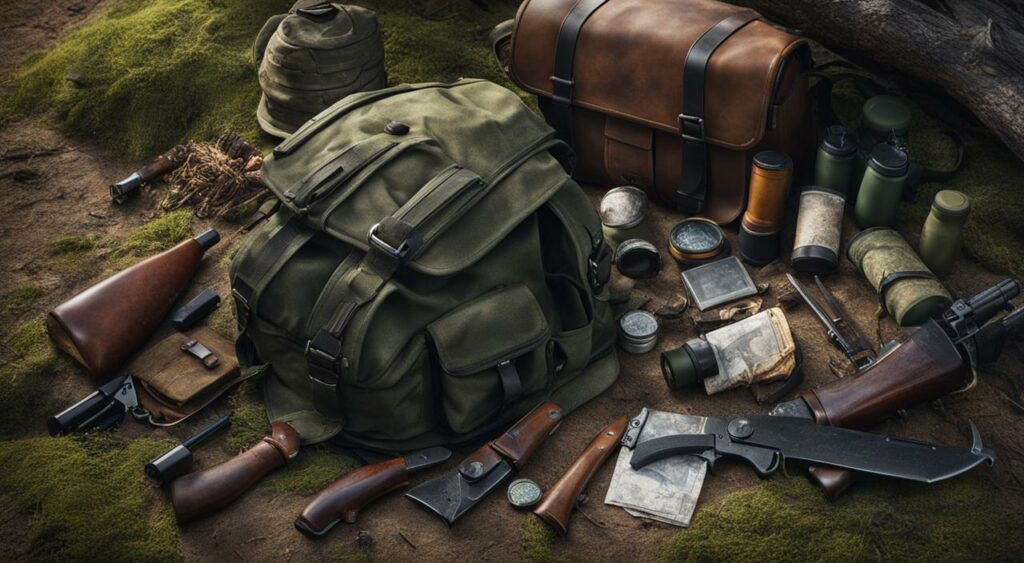
“No matter which type of backpacking hunting gear you choose, make sure it fits your specific needs and preferences. The right gear can make the difference between an enjoyable trip and a miserable one.”
Building Your Backpacking System
Creating a successful backpacking hunting trip requires the right gear, and building a comprehensive backpacking system is the first step.
When considering your current backpacking system, keep in mind the specific needs of hunting.
While a general gear list for backpacking is a good starting point, it’s essential to tailor it to hunting-specific requirements.
Assess Your Needs
To begin building your backpacking system, assess your needs. Consider the length of your trip, terrain, weather conditions, hunting equipment, and the amount of backcountry experience you have.
This assessment will provide insight into the type of gear you will need and guide your purchases.
Research and Compile a Gear List
Research and compile a gear list that fits your requirements and preferences. Use credible sources, such as hunting websites, gear reviews, and forums, to inform your decision-making.
You can also consult with experienced hunters in your network to get their advice.
When making your gear list, prioritize essential items such as a reliable and lightweight backpack, situational clothing, a quality sleeping bag, and a durable and breathable tent.
Additionally, you will need to ensure that you are well-fed and hydrated during the trip. Therefore, consider bringing a water filter, stove, and high-energy food.
Try Before You Buy
Before making any purchases, try out the gear whenever possible. This can include testing backpacks, sleeping bags, and tents, as well as trying on clothing and footwear.
Testing gear allows you to determine what works best for you and what is most comfortable to carry and use while hunting.
Learn to Pack Efficiently
To ensure that you can carry all of your necessary gear during your hunting trip, you must learn to pack efficiently.
This includes organizing your gear according to weight and function, using compression bags and packing cubes, as well as minimizing non-essential items.
An organized, efficient packing system will ensure that you can easily find and access the gear you need, even in challenging backcountry conditions.
Building a comprehensive backpacking system for your hunting trip is essential for a successful and enjoyable experience.
By assessing your needs, researching and compiling a gear list, trying gear before purchasing, and packing efficiently, you can ensure that you are prepared for any challenges that arise in the backcountry.
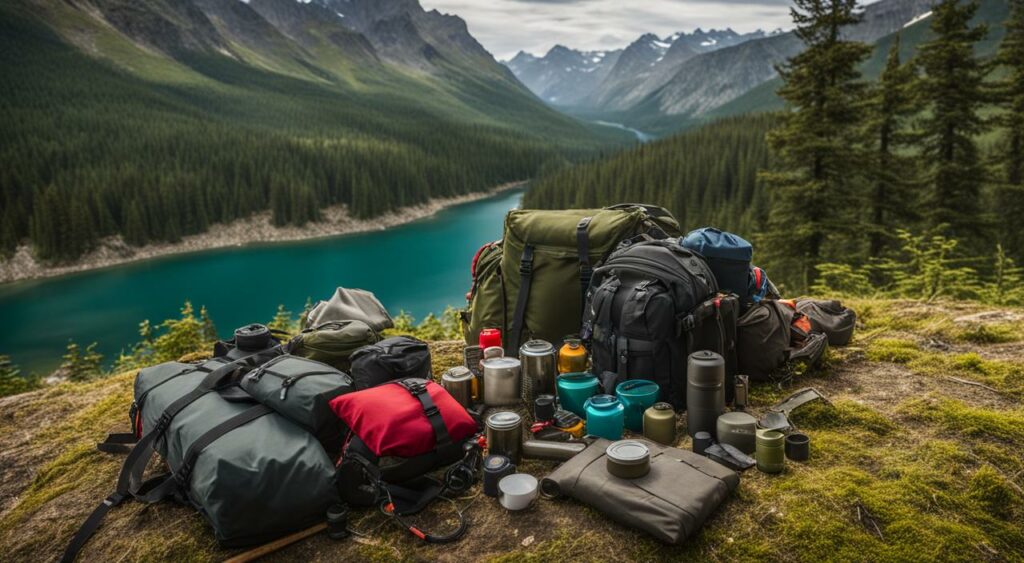
Backcountry Gear Checklist for Hunting
In order to have a successful hunting trip in the backcountry, it’s important to ensure that you have all the necessary gear.
This checklist includes suggested gear for backpacking hunting trips, as well as specific hunting-related gear that should be included on any backcountry hunting trip.
Backcountry Pack List
A high-quality backpack is essential for any backcountry hunting trip. It’s important to choose a pack that fits well and has enough space to carry all of your gear.
Here are some items that should be in your pack:
- Food and water
- A lightweight stove and fuel
- Cooking utensils and dishware
- Clothing appropriate for the weather conditions
- Sleeping bag and pad
- Tent or shelter
- A navigation tool such as a compass or GPS
- A headlamp or flashlight with extra batteries
- A first aid kit
- A multitool or knife
Suggested Gear for Backpacking
In addition to the items listed above, there are some additional items that are important for backpacking trips:
- A lightweight backpack
- Filtration system for water
- Emergency blanket
- Lightweight rain gear
- Repair kit for gear
- A hiking pole or trekking pole
- A bear canister for storing food
- Waterproof matches or a lighter
- A whistle or signal mirror for emergencies
Backcountry Gear List
When it comes to hunting-specific gear for backcountry trips, there are some additional items that should be included on your gear list:
- A hunting license and necessary permits
- A quality hunting rifle or bow
- Ammunition or arrows
- Binoculars or a spotting scope for scouting game
- A field dressing kit for processing game
- A game bag for transporting meat
- A hunting knife
By following this backcountry gear checklist for hunting, you can ensure that you are fully prepared for your trip.
Remember to always prioritize safety and take the necessary precautions when venturing into the backcountry.
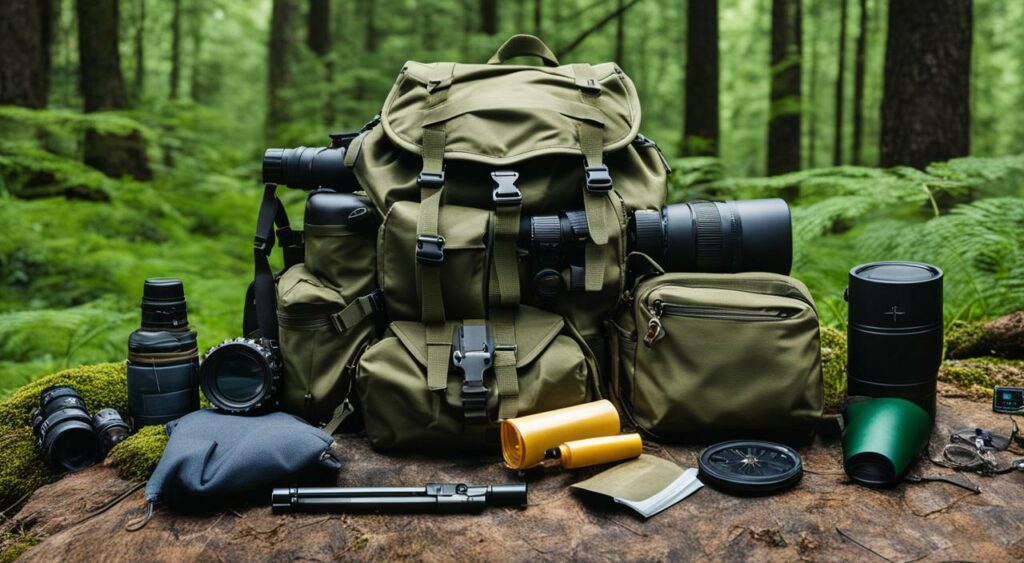
Backpacking Gear Reviews
When preparing for a backpacking hunting trip in the winter, having the right gear can make all the difference.
In this section, we will review some of the best ultralight backpacking gear options for winter hunting trips.
Ultralight Backpacking Gear
Ultralight backpacking gear is a preferred option for hunters because of its lightweight nature and durability.
The Patagonia Ultralight Down Jacket is a great option for a warm winter jacket that won’t add bulk to your backpack.
The jacket has a 15D Pertex Quantum shell with 800-fill-power Advanced Global Traceable Down, which is both warm and eco-friendly.
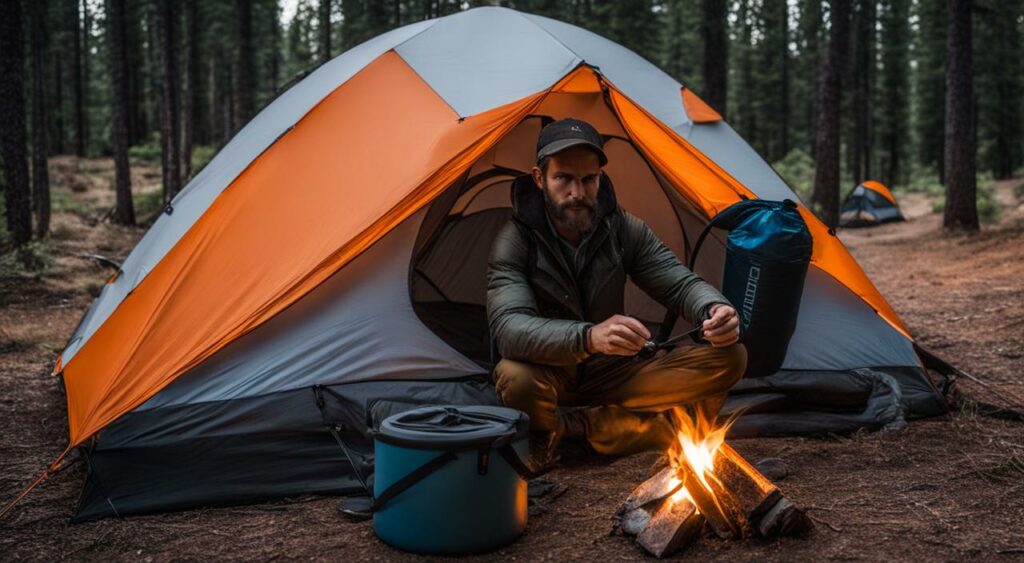
The Therm-a-Rest NeoAir XTherm Sleeping Pad is another essential piece of ultralight backpacking gear.
It has an R-Value of 6.9, making it one of the warmest sleeping pads on the market, and it weighs only 15 ounces, making it easy to pack and carry on long hikes.
Winter Hiking Gear
Winter hiking requires specialized gear to handle the cold and snow.
The Salomon Quest 4D 3 GTX Hiking Boots are an excellent choice for hunters in need of sturdy, waterproof winter hiking boots.
They are made with Gore-Tex waterproofing and have a high ankle design for added support on rough terrain.
The Black Diamond Trail Pro Shock Trekking Poles are another must-have item for winter hiking trips.
The poles have a built-in shock absorber system to reduce impact on joints and are adjustable to fit hikers of different heights.
Winter Backpacking Gear
When it comes to winter Backpacking, the Osprey Atmos AG 65 Backpack is an excellent choice.
It is designed for comfort and support on long treks, with an anti-gravity suspension system that distributes weight evenly across the back.
The backpack also has a removable top lid that can be used as a daypack for shorter excursions. Another essential item for winter backpacking is the MSR Reactor Stove System.
It is a compact and efficient stove that can boil water quickly, even in challenging weather conditions. It is also lightweight and easy to pack.
Optics Checklist for Backpacking Hunting
When planning a backpacking hunting trip, optics are among the most essential gear items.
Having the right optics can make a significant difference in your overall hunting experience and success. Here are some essential optics to include in your backpacking hunting checklist:
| Optics | Function | Recommended Models |
|---|---|---|
| Rifle Scope | For accurate shot placement | Leupold VX-5HD, Vortex Viper PST Gen II |
| Binoculars | For spotting and identifying game at long distances | Leica Ultravid HD-Plus, Vortex Viper HD, Maven B3 |
| Spotting Scope | For observing game at long distances and determining trophy quality | Leupold SX-5 Santiam HD, Vortex Viper HD, Swarovski ATX |
| Range Finder | For determining the distance to the target | Leupold RX-2800 TBR/W, Vortex Fury HD 5000, Sig Kilo 2400ABS |
It’s crucial to choose high-quality optics that meet your specific needs and preferences.
Lightweight options are ideal for backpacking hunting trips, but you should also consider factors such as magnification, objective lens size, and image quality.
To ensure that your optics are always in good condition for hunting, make sure to clean and maintain them regularly.
This will ensure that your optics are free from dust, debris, and water damage that can impair their performance.
By including these essential optics in your backpacking hunting checklist, you’ll be better equipped to spot and target game with precision and accuracy.
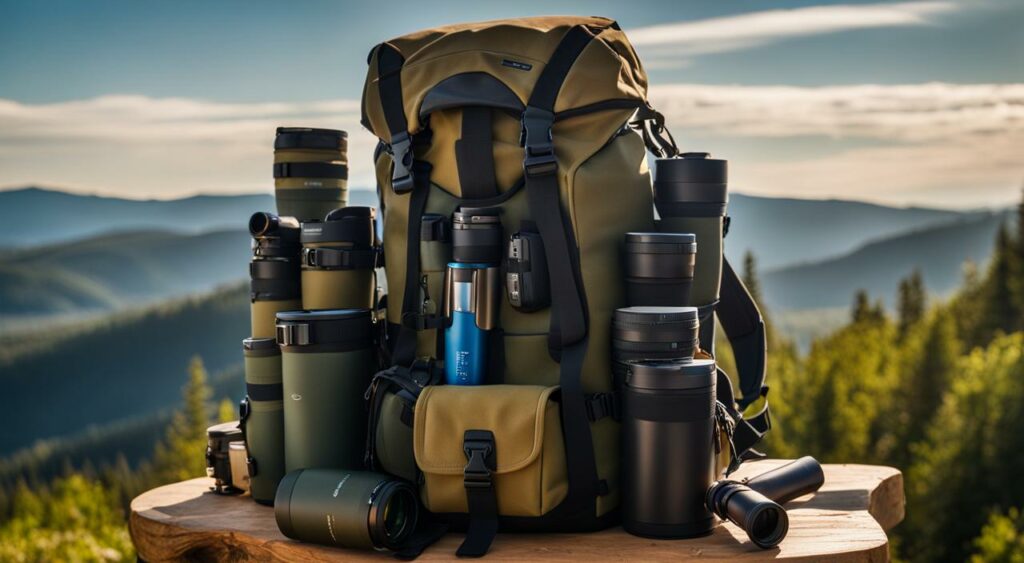
Packing Tips for Backcountry Hunting
Proper packing for a backcountry hunting trip is crucial to ensure you have all necessary gear and supplies while also maintaining a manageable weight.
Below are some essential packing tips:
1. Create a Packing List
Before packing, create a list of all necessary gear and supplies to avoid forgetting anything. Consider the length of your trip, terrain, weather conditions, and any planned activities.
You can use ready-made packing lists for backpacking or hunting as a starting point or create your own personalized list.
Tip: Check out REI’s backpacking checklist or Realtree’s hunting checklist for reference.
2. Prioritize Essential Gear
When packing, prioritize essential gear such as shelter, sleeping gear, and food.
Also, make sure to bring proper clothing for the weather conditions and any necessary hunting gear such as weapons and ammunition.
Leave behind any non-essential items that add unnecessary weight.
3. Test Your Gear
Prior to your trip, test all your gear to make sure everything works as intended. Set up your shelter, test your stove, and make sure your weapons are properly sighted in.
It’s better to identify any issues before you’re stuck in the backcountry.
4. Organize Your Gear
Organize your gear in a logical manner to make it easy to access. Pack heavier items closer to your back and lighter items further away.
Use compression sacks to compress gear and maximize space in your backpack. Keep frequently used items such as snacks and water within easy reach.
5. Use the Right Backpack
Choosing the right backpack is crucial for a comfortable and efficient trip. Look for a backpack with a proper fit, durable materials, and sufficient padding.
Also, consider the size of the backpack and make sure it can comfortably fit all your gear.
6. Familiarize Yourself with Packing Restrictions
Make sure to familiarize yourself with any packing restrictions imposed by your airline or transportation provider. This includes both weight and size restrictions for both checked luggage and carry-ons.
Tip: Check out FAA’s Pack Safe website for guidelines on packing hunting gear for air travel.
7. Frequently Asked Questions
- How do I pack for a long-duration trip? Pack enough food and necessary items for each day of the trip.
- You can also pack items that can be reused, such as water purification tablets and washable clothing.
- How much weight should I carry? Aim to carry no more than 20-30% of your body weight.
- For example, if you weigh 150 pounds, your backpack should weigh no more than 45 pounds.
- How do I pack for different weather conditions? Pack clothing layers that can be added or removed based on temperature changes.
- Bring waterproof gear to protect against rain or snow.
- What’s the best way to pack hunting gear? Pack your hunting gear in a separate compartment or pocket to keep it organized and easily accessible.
By following these packing tips, you’ll be well-prepared for a comfortable and successful backcountry hunting trip.
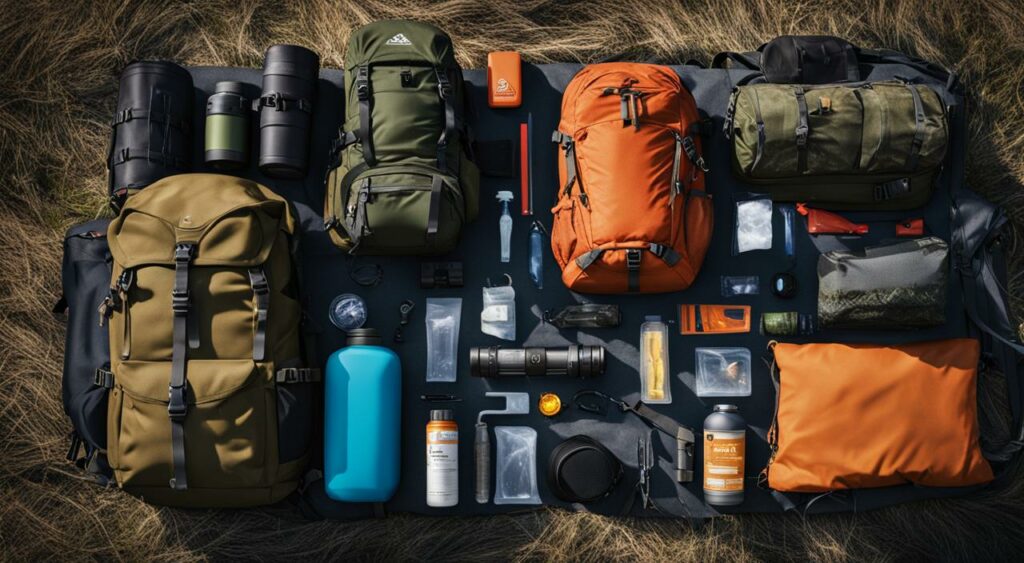
Tips for Hiking and Navigating in the Backcountry
Backcountry hunting requires a significant amount of hiking and navigation in rugged terrain. Therefore, it’s essential to have the necessary skills and knowledge to ensure a safe and successful trip.
Here are some tips to help you hike and navigate in the backcountry.
Choose Great Hikes for Backpacking
When planning your backcountry hunting trip, research the hiking trails in the area and choose the ones that are suitable for backpacking.
The best hikes for backpacking are those that provide access to remote hunting areas and offer stunning views of the surrounding wilderness.
Consider hiking trails that vary in terrain, elevation, and difficulty to add some excitement to your trip.
Be Prepared for Off-Trail Hiking
Off-trail hiking is an essential skill for backcountry hunting. Before embarking on your trip, learn basic navigation skills such as using a map and compass, orienteering, and using GPS systems.
These skills will come in handy when you are off the beaten path and need to navigate through unfamiliar terrain.
Safety Considerations in the Mountains
Mountainous terrain can be unpredictable and dangerous. Therefore, it’s essential to take safety precautions when hiking in the mountains.
Before setting out, check weather forecasts and terrain conditions. Avoid hiking during stormy weather or in areas prone to rockslides or avalanches.
Carry a first-aid kit, a survival blanket, and a signaling device to call for help in case of an emergency.
Know Your Limits
It’s crucial to know your physical limits when hiking in the backcountry. Don’t push yourself too hard or attempt terrains that are beyond your skill level.
Take frequent breaks to rest, rehydrate, and refuel. Listen to your body and slow down if you start feeling exhausted or dizzy.

Conclusion
Having the right gear is essential for a successful backpacking hunting trip. This hunting gear list will ensure that you have all the necessary items for backcountry hunting.
From choosing the appropriate backpack and hunting gear to packing efficiently and navigating the terrain, it’s crucial to be well-prepared for the challenges of backcountry hunting.
Remember to tailor your backpacking hunting checklist to your specific needs and preferences, and don’t forget to include hunting-specific gear.
A well-thought-out backpacking system will make a significant difference in your hunting experience, providing comfort and peace of mind.
Whether you’re off on a solo hunting adventure or with a group, having the right backpacking gear and backcountry hunting gear is key to a successful and safe trip.
So, grab your hunting pack, check off each item on your checklist, and head out for an unforgettable backcountry hunting experience.

FAQ
-
Why is having a backpacking hunting checklist important?
Having a checklist ensures that you don’t forget any essential items for your hunting trip. It helps you stay organized and prepared, whether you’re going on an elk or deer hunt in the backcountry.
-
What are some essential gear items that should be included in a backpacking hunting checklist?
Some key items to include in your backpacking hunting gear checklist are hunting-specific gear such as a rifle or bow, ammunition, binoculars, a knife, and game bags. You should also include important items for backpacking in general, such as a lightweight backpack, sleeping bag, food, water, and navigation tools.
-
How do I choose the right backpacking hunting gear?
When choosing backpacking hunting gear, consider the benefits of lightweight gear for long-distance hikes. You should also think about the trade-offs of heavier gear and how it may impact your overall backpack weight. It’s important to find a balance between functionality and comfort.
-
What should be included in a backcountry gear checklist for hunting?
A comprehensive backcountry gear checklist for hunting should include items such as a tent or shelter, stove, water filtration system, first aid kit, fire starter, bear spray, and appropriate clothing for variable weather conditions. It’s important to be well-prepared for the challenges of hunting in remote areas.
-
What are some recommended optics gear for backpacking hunting?
Essential optics gear for backpacking hunting includes a quality pair of binoculars, a spotting scope, and a rangefinder. These tools can greatly enhance your hunting experience by improving your ability to spot game and accurately measure distances.
-
Do you have any packing tips for backcountry hunting?
Yes! When packing for backcountry hunting, ensure that you have a well-organized packing system. Use stuff sacks or compression bags to maximize space in your backpack. Consider the weight distribution and pack items strategically. It’s also helpful to make a checklist and prioritize essential items.
-
What are some hiking and navigating tips for the backcountry during hunting trips?
When hiking and navigating in the backcountry, choose suitable hikes that match your skill level and physical capabilities. Be prepared for off-trail navigation by carrying a map, compass, and GPS device. Familiarize yourself with the terrain and have a plan for emergencies. Always prioritize safety.

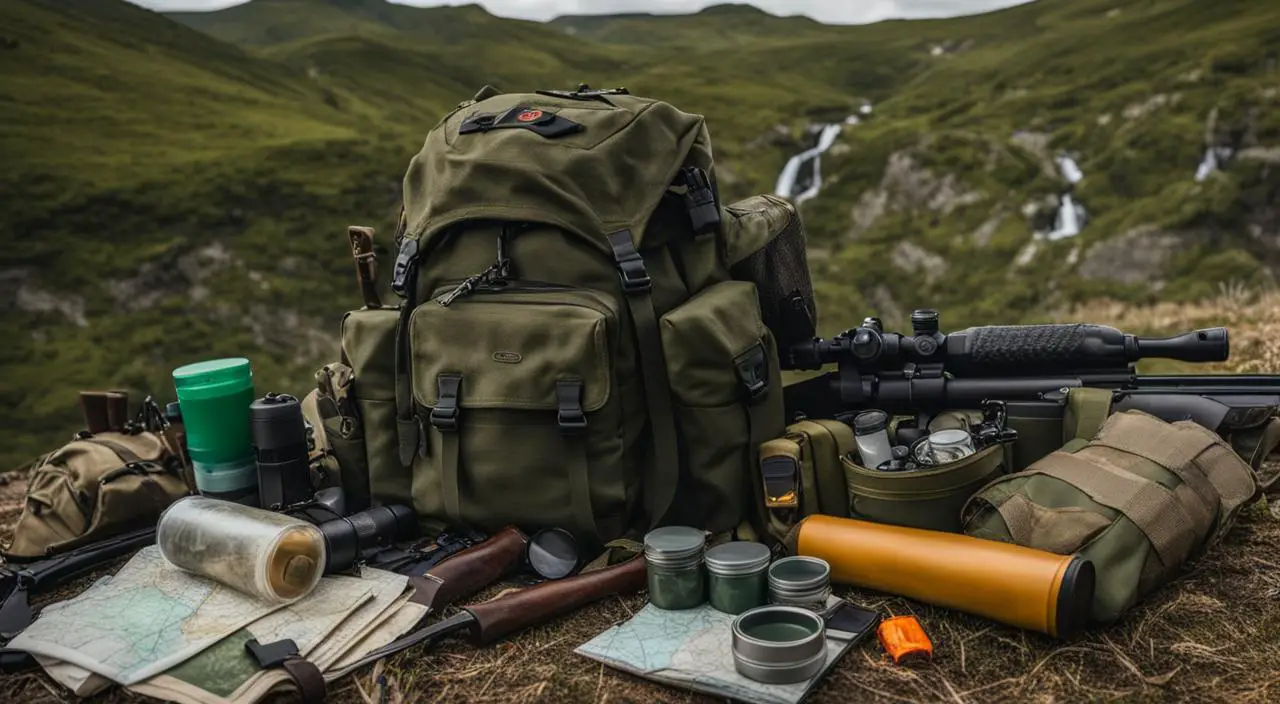

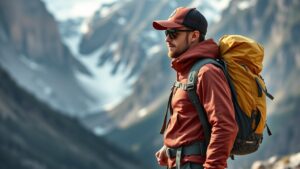
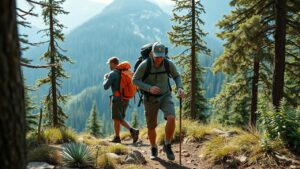


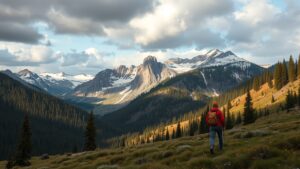

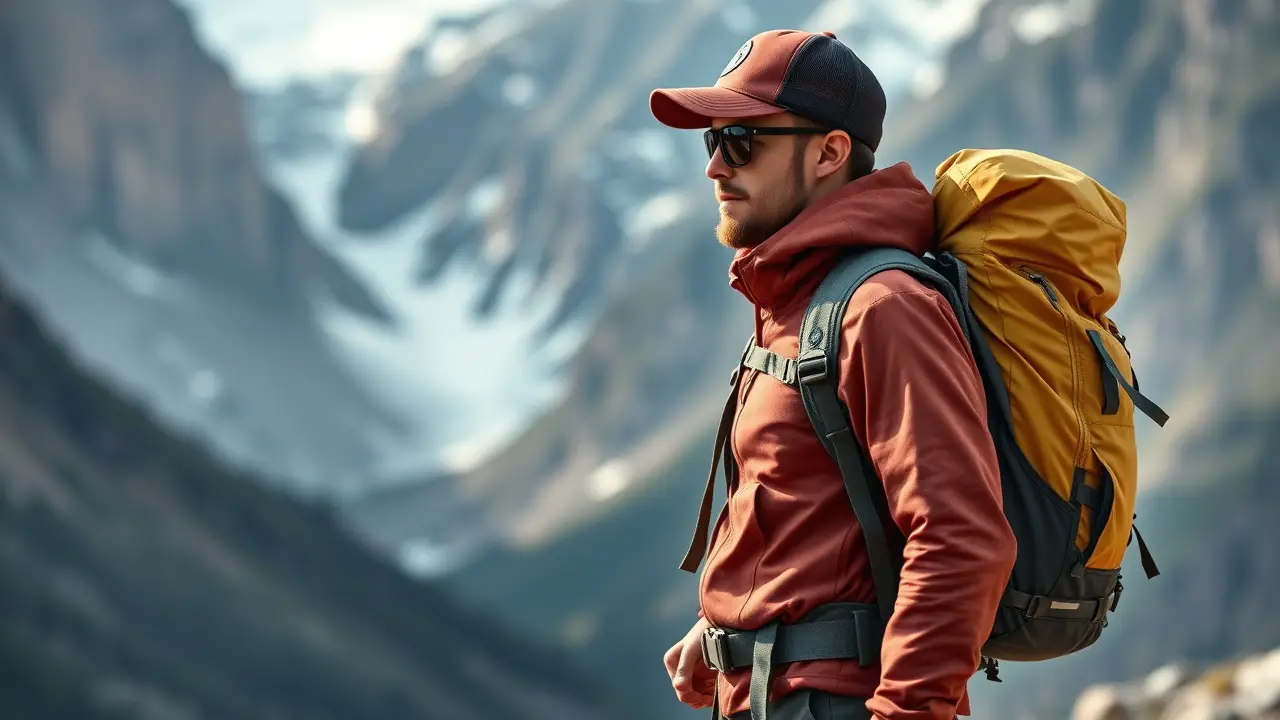
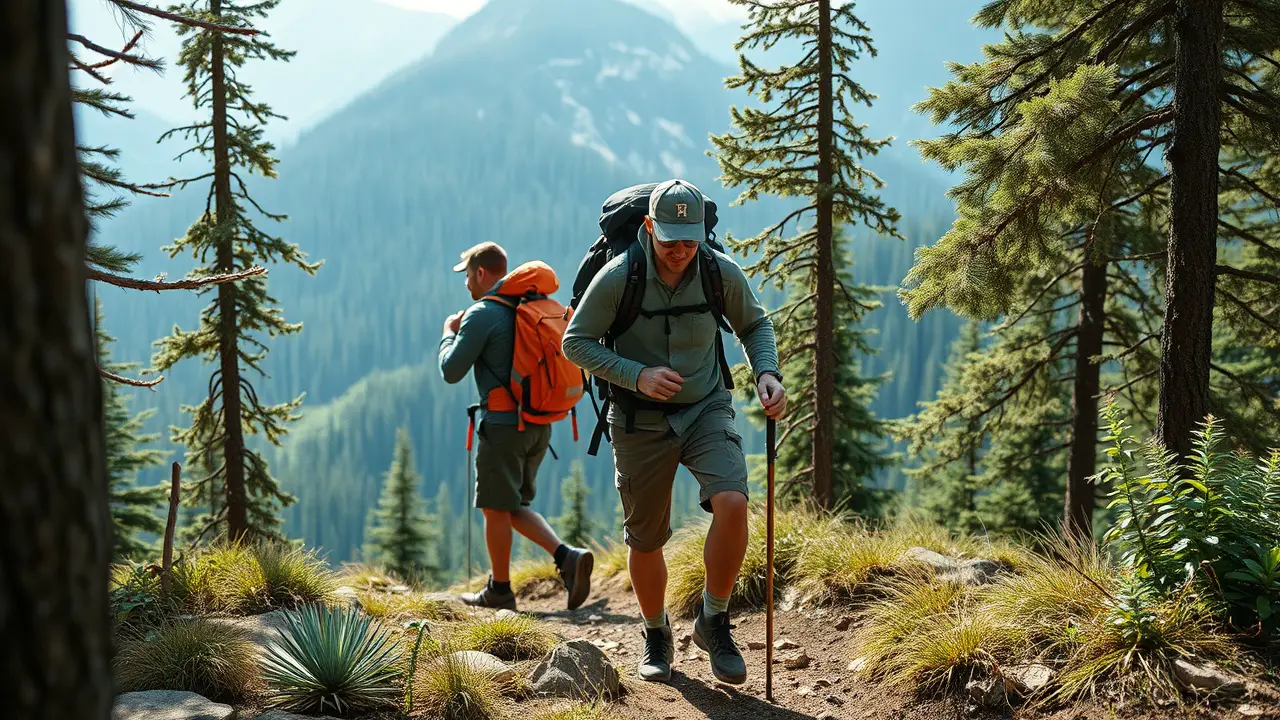
Leave a Reply